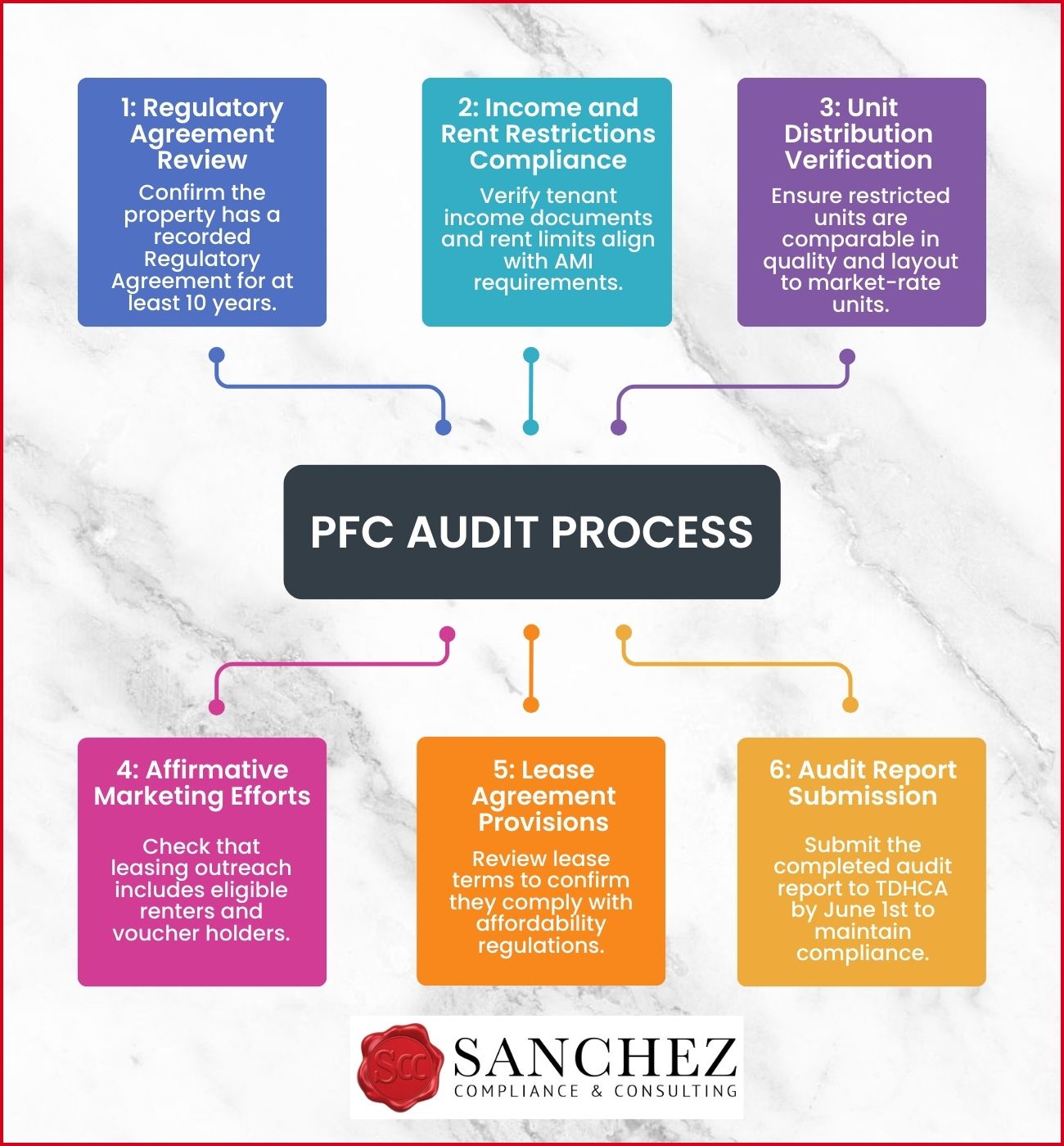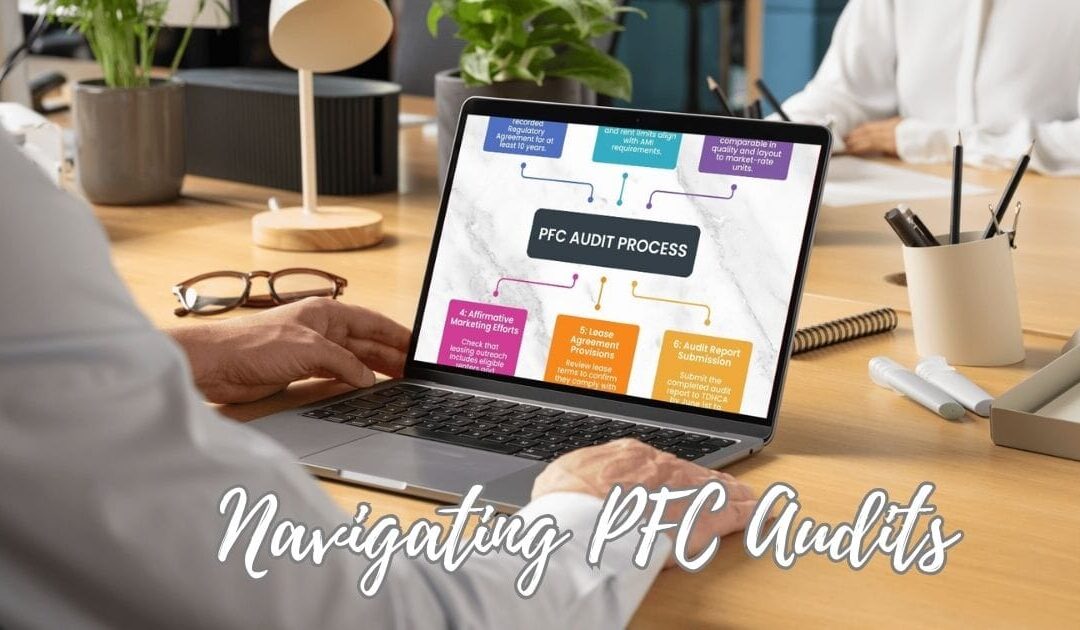Ever felt lost trying to figure out affordable housing finance? You are not alone. Many property management companies struggle with complex regulations, especially the Public Facility Corporation (PFC) audit process.
At Sanchez Compliance and Consulting, we have 20 years of experience in affordable housing compliance, working with non-profits, private companies, and state agencies nationwide to help them navigate PFC audits and regulatory challenges. As certified experts in housing compliance—holding designations such as Housing Credit Certified Professional (HCCP), Certified Occupancy Specialist (COS), and National Compliance Professional-Executive (NCP-E)—we’ve seen firsthand how recent legislative changes, like Texas House Bill 2071, have transformed PFC oversight. Understanding these updates is critical for property owners to maintain compliance and protect their tax benefits.
The world of Public Facility Corporation audit rules has changed. Texas recently made big updates, so staying informed is crucial.
Table Of Contents:
- Understanding the Basics of Public Facility Corporations
- New Reporting Requirements for PFCs
- Impact of the Recent Amendment on the Public Facility Corporation audit
- Key Elements of a PFC Audit
- Who Can Conduct a PFC Audit?
- Consequences of Non-Compliance
- Practical Implications for Property Managers
- How a Public Facility Corporation audit Affects Affordable Housing
- Controversies and Criticisms Surrounding PFCs
- Benefits Beyond Rent Reduction and What the Future of Public Facility Corporation audit
- FAQs about Public Facility Corporation audit
- Conclusion
Understanding the Basics of Public Facility Corporations
What’s a Public Facility Corporation (PFC)? A PFC is a nonprofit organization. In Texas, it plays a role in creating mixed-income housing.
PFCs can construct, buy, and upgrade multifamily homes. Private developers may get property tax breaks through PFCs, if they help with affordable housing.
How PFCs Work in Texas
Texas Local Government Code, Title 9, Subtitle C, Chapter 303 governs PFCs in Texas. The 88th Texas Legislature updated this law with House Bill 2071 (HB 2071), effective June 18, 2023.
It added reporting rules and gave the TDHCA oversight for compliance. The TDHCA rules on PFC Compliance Monitoring are in the Texas Administrative Code, Title 10, Part 1, Chapter 10, Subchapter I.
New Reporting Requirements for PFCs
The Texas Department of Housing and Community Affairs (TDHCA) Governing Board approved a change on July 25. This change affects reporting for public facility corporations (PFCs) and is found in agenda item #13 of the board book.
PFCs now must file an Audit Report, but there are exceptions. Some developments don’t need to report if they meet certain rules.
Exemptions to Reporting
Developments are exempt if at least 20% of their units are for public housing. There are more conditions, too.
Developments in the Rental Assistance Demonstration (RAD) program are exempt. Also exempt are those getting help from Chapter 1372, Government Code, or through tax-exempt bonds.
Developments getting money under Subchapter DD, Chapter 2306, Government Code, are also exempt. This includes the Low Income Housing Tax Credit program.
Deadlines for Audit Reports
The first report for a PFC-owned multifamily development is due by June 1 of the year after it’s acquired. Or, it’s due when the first tenant moves in, whichever comes later.
We’ve seen cases where properties scramble at the last minute to submit audit reports, only to find that key documentation is missing or incomplete. By proactively organizing records throughout the year, properties can avoid unnecessary stress and ensure smooth compliance.
Impact of the Recent Amendment on the Public Facility Corporation audit
Before the amendment, there was uncertainty. People didn’t know if PFC deals made before June 18, 2023, had to follow the new rules. Many PFCs missed the June 1, 2024, deadline for 2023 filings, risking penalties.
As of 2025, all PFC audit reports must comply with updated submission deadlines set by TDHCA.
Public Comments and Future Rule Amendments
TDHCA’s Governing Board approved more changes to the PFC Compliance Monitoring Rule, effective February 26, 2024.
There are new proposed rule changes, too. These include a chance for public comments, so you can share your views.
Proposed Changes and Public Comment Period
Proposed changes require all PFC multifamily residential developments to submit annual Audit Reports to TDHCA by December 1. Starting in 2025, all PFC multifamily residential developments must submit annual audit reports to TDHCA by June 1st of each year.
You can see the current rule on TDHCA’s website. Look for the section on Public Facilities Corporation Compliance Monitoring.
Key Elements of a PFC Audit
A PFC audit checks several things to make sure developments meet standards. Here’s what auditors look at:
 Image Caption
Image Caption
Regulatory Agreement Review
Auditors first check for a Regulatory Agreement. This document must be properly recorded and have at least a 10-year term.
This agreement shows a long-term commitment. It ensures the project meets affordability rules.
Income and Rent Restrictions Compliance
Auditors check files to see if rent and income rules are followed. They look at initial tenant paperwork and recurring tenant approvals.
This confirms tenants still qualify. The income limit keeps housing affordable for eligible households, based on household size and area median income.
| Household Size | Income Limit (Example) |
|---|---|
| 1 Person | $40,000 |
| 2 People | $45,000 |
| 3 People | $50,000 |
| 4 People | $55,000 |
Let’s say a PFC property requires tenants to earn no more than 80% of the Area Median Income (AMI). If the AMI for a two-person household is $56,250, then the maximum allowable income would be:
$56,250 × 0.80 = $45,000 per year
If a two-person household applies and their combined income is $44,500, they qualify because their income is below the $45,000 limit shown in the table. However, if their income is $46,000, they would exceed the cap and may not be eligible for a restricted unit.
Unit Distribution Verification
It’s about unit distribution, not just affordability. Restricted units should reflect the layout of non-affordable units.
When we conduct PFC audits, we often find that property managers struggle with unit classification, leading to misreported data and compliance violations. Ensuring that units are correctly categorized as restricted or reserved is one of the most frequent challenges we help resolve.
This mix prevents segregation and supports a balanced community.
 Affirmative Marketing Efforts
Affirmative Marketing Efforts
Developments must market to people with housing choice vouchers. PFCs help integrate affordable housing into communities.
This outreach helps voucher holders find rentals. The audit checks if efforts meet rules.
Lease Agreement Provisions
Tenant leases are also reviewed. Leases should give tenants required security, keeping them stable in their units.
Audit Report Submission Process
Submit completed Audit reports and documents by emailing pfc.monitoring@tdhca.texas.gov.
Direct questions to Wendy Quackenbush or Amy Hammond. Email wendy.quackenbush@tdhca.texas.gov or amy.hammond@tdhca.texas.gov.
Who Can Conduct a PFC Audit?
Choosing a qualified auditor is important. Not just anyone can do this; specific qualifications are needed.
Auditor Qualifications
Auditors should have experience with housing regulations. A Certified Occupancy Specialist (COS) certification is a good indicator of competence.
The candidate’s qualifications should clearly show their ability to do the audit. Auditors cannot be connected to or related to the Comptroller, to prevent bias.
Independence and Impartiality
Auditors can’t be connected to the PFC. They also can’t work for those tied to the government or its employees.
Anyone who has recently overseen property management also cannot be an auditor. These rules prevent conflicts of interest, keeping the audit fair.
Rotation of Auditors
Developments can use the same auditor for three audits. After that, a new auditor must be selected.
Consequences of Non-Compliance
What if an audit finds problems? TDHCA will respond within 45 days if issues are found in the report.
Notification and Cure Period
After notification, owners must fix the issues. Failing to do so leads to consequences.
Loss of Tax Exemption
The development could lose its ad valorem tax exemption, potentially costing millions over the years. This exemption is a key benefit for properties participating in affordable housing programs under the Texas local government code.
Dispute Resolution
Disputes about audit findings should be resolved. Talk with the auditor and audit staff to find solutions.
Practical Implications for Property Managers
Staying on top of PFC audits is crucial for property managers. Here’s some advice:
Maintaining Accurate Records
Keep thorough records. Make sure files include data on resident certifications.
From our experience, properties that implement regular compliance training for staff are significantly less likely to receive audit findings related to misfiled tenant records or missing regulatory reports.
Good records save time and show compliance during audits. Accurate files can also help minimize potential audit adjustments and help prevent the loss of any tax exemptions that apply. Detailed paperwork is vital for all affordable housing developments.
Understanding Regulatory Requirements
Understand regulatory requirements. Training helps your team know what’s expected and follow procedures.
This minimizes errors and supports ongoing compliance. Proper training also reduces the risk of penalties from failed audits.
Working with an Experienced Auditor
Choose an experienced professional auditor. A qualified auditor can help with a Public Facility Corporation audit.
This partnership helps you stay updated and reduces audit delays. An expert can be especially helpful when discussions occur with upper management.
How a Public Facility Corporation audit Affects Affordable Housing
PFCs and tax exemptions aim to create affordable rental options. But opinions differ on their actual impact on renters.
Creation of Affordable Units
PFCs require projects to keep at least half of the units at affordable rates for lower-income individuals. Supporters say these rules ensure rent reductions due to property owner participation. The involvement of a nonprofit organization as a general partner can further support this goal.
Critics point to issues limiting the impact on the rental market. Some newly constructed properties may still have relatively high market rents, despite some restricted units. These criticisms raise questions about whether the PFC structure adequately fulfills its intended purpose, impacting broader discussions on affordable rental housing.
Long-Term Affordability
Agreements set rent and income standards to maintain affordable options long-term. These protections keep rentals affordable, preventing large cost increases.
Maintaining low rates requires constant attention. Rules require keeping rents low, ensuring stable, affordable housing for the contract’s duration.
Controversies and Criticisms Surrounding PFCs
Using property tax subsidies through public entities raises questions about ethics and transparency. Critics often claim the PFC setup lets corporations gain unfair tax advantages, while providing only small rent reductions at tax-exempt properties. Many of these arrangements involve a limited partnership structure.
PFCs are controversial when involving taxpayer-funded assets. PFC deals face criticism for offering limited affordable rental options, often in newly constructed buildings. Concerns arise when publicly funded agencies partner with businesses benefiting individual stockholders, raising questions about financial returns and governance transparency.
Critics question tax break benefits. Experts suggest monitoring subsidized housing’s impact on low-earning groups, especially considering local factors like the area median income as set forth by each local appraisal district.
Benefits Beyond Rent Reduction and What the Future of Public Facility Corporation audit
Supporters emphasize benefits beyond rent. They claim PFC engagement boosts economic growth, creating jobs and encouraging private investment nearby.
Economic Development
Supporters say projects under agreement provide more than just discounts for individual occupants. New projects boost construction, requiring labor and increasing local tax revenue.
Economic benefits extend beyond a single location. They create steady jobs and enhance community earnings, but a careful analysis is needed to balance financial advantages with affordable housing access. Many developments also operate under a ground lease, impacting the overall financial structure.
Community Benefits and Funding Stream for Affordable Housing
Additional community improvements occur with Public Funding Company projects. They generate ongoing funds for future projects, improving market conditions.
Proponents highlight creating a reliable funding source for underserved communities. This infrastructure continues contributing, regardless of direct renter costs. Continued oversight and regulatory updates can help maintain positive impacts on compliance in affordable homes.
Continued oversight can greatly help everyone involved in property management, specifically in San Antonio. Many hope for an improvement to the San Antonio housing situation and an easier time for the San Antonio Housing Trust.
FAQs about Public Facility Corporation audit
What is a Texas public facility corporation?
In Texas, a public facility corporation (PFC) is a nonprofit entity under state law. PFCs can help with affordable housing and community development.
One example mentioned frequently is developments near Longhorn Quarry, often financed through a Texas limited partnership. These Texas limited partnerships allow developers to create affordable rental housing, especially in high-demand areas.
What is the PFC tax?
“PFC tax” refers to exemptions from usual property tax rates in Texas. Public facility corporations use this to offer lower rents, encouraging affordable housing development.
This partnership, frequently a Texas limited partnership, creates financial incentives, but also includes rent restrictions. It’s a key way for a housing authority to add more units with below market rent in their portfolio.
Conclusion
A Public Facility Corporation audit is important, with broader impacts than initially thought. Understanding regulations, compliance, and community impacts is crucial for everyone involved. The audit ensures a key method of offering affordable housing, which many seek, including housing choice voucher holders.
Knowing the latest laws helps operators avoid problems and keep tax benefits. It keeps the Public Facility Corporation audit system smooth, offering transparency and benefits for the community, using tools like AMI adjusted data to help with compliance and calculations, using figures relevant to family size.
Need Expert Help with Your PFC Audit?
Staying compliant with PFC regulations can be complex, but you don’t have to navigate it alone. Sanchez Compliance & Consulting has 20 years of experience helping property owners and managers stay audit-ready and protect their tax exemptions.
Contact us today to ensure your compliance is in check and avoid costly penalties!


